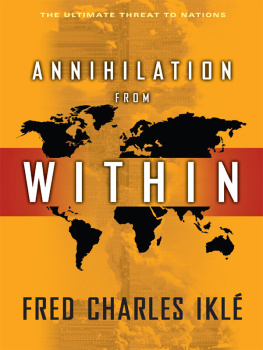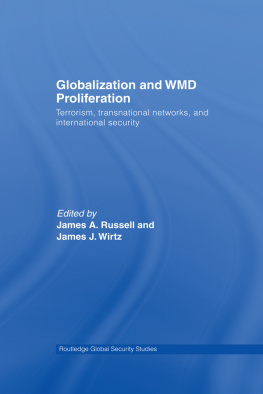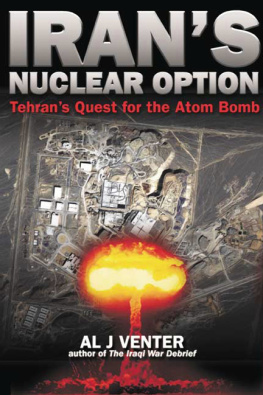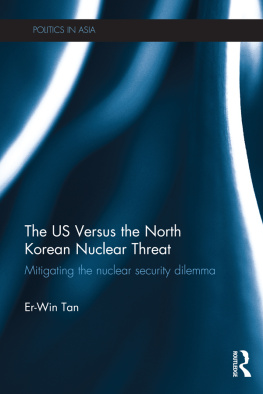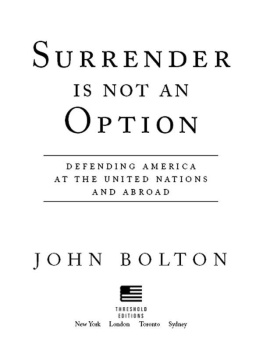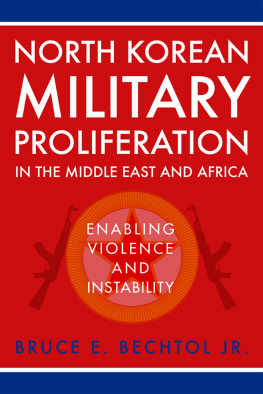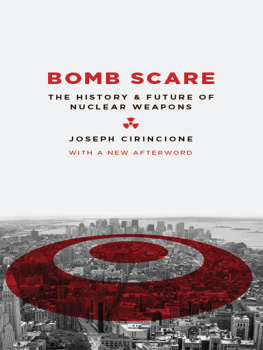ANNIHILATION FROM WITHIN
FRED CHARLES IKL
THE ULTIMATE THREAT TO NATIONS
Columbia University Press
New York
Columbia University Press
Publishers Since 1893
New York Chichester, West Sussex
cup.columbia.edu
Copyright 2006 Fred Charles Ikl
All rights reserved
E-ISBN 978-0-231-51140-7
Library of Congress Cataloging-in-Publication Data
Ikl, Fred Charles.
Annihilation from within :
the ultimate threat to nations / Fred Charles Ikl.
p. cm.
Includes bibliographical references and index.
ISBN 0-231-13952-7 (cloth : alk. paper)
1. Security, International. 2. TechnologySocial aspects.
3. Terrorism. 4. Radicalism. 5. Nuclear disarmament.
I. Title. JZ5595.I35 2006
355.033dc22 2006019331
A Columbia University Press E-book.
CUP would be pleased to hear about your reading experience with this e-book at .
CONTENTS
THE STORY LINE OF THIS BOOK IS AT ONCE FORWARD-LOOKING AND HISTORICAL. The prospect ahead features revolutionary new threats to national security and could end in demolition of the existing world order. Looking backward, the story traces this coming upheaval to historic forces that have been centuries in the making. Todays menacesjihadist terrorism, rogue nations producing nuclear bombsmay be viewed as mere symptoms of these forces, as the rustling wind that foretells the gathering storm. Few military strategists and political experts have grasped the dimensions of the storm awaiting us. Fewer still are mindful of its historic evolution.
The emerging crisis is the outgrowth of technological progress. It reflects the dark side of progress. Globalization guarantees the ceaseless spread of new technologies, whether beneficial or destructive. The nuclear age offers the clearest lesson of this problem. Until the end of the Cold War, it appeared that we were somehow managing the nuclear threat. Over a span of half a century, the political and military leaders of the nuclear powers were able to pursue strategies that averted the use of nuclear weapons. Their long-run success in maintaining the regime of non-use is one of the greatest achievements in the history of military strategy.
Alas, the world is now different. After our stressful journey through the Cold Wara journey with a happy endingwe now face a ghastly new predicament. One nation after another is starting up nuclear programs, allegedly for peaceful purposes, but often and obviously as a stratagem for getting to an arsenal of nuclear weapons. And the proliferation problem does not end there. A cascade of frightening news reports tells us that the control of national governments over nuclear materials and bombs is far from secure. The inescapable subtext of these reports is that, all too soon, we must expect these weapons to be acquired by doomsday cults, anarchists, and terrorist gangs.
Other technologies, not yet on the radar screens of the worlds media, will be even more resistant to political control. It is well known that immensely beneficial advances in the life sciences can be misused to develop biological weapons. But the most revolutionary impact of the life sciences might be the most difficult to control: the conquest of the human mind by brain science. A vast enhancement in intelligent decision-making might be just decades away. Some powerful nations have already built elaborate command and decision centers that exploit the capabilities of the latest computer systems. As day follows night, these projects will gradually take advantage of the rapid advances in brain science to complement the strengths of computers with the unique capabilities of the human brain. If these projects are successful, they will achieve a superhuman intelligence able to trump the performance of first-rate human experts and the latest super-computers. Any such leap forward in intelligent decision-making would be a change comparable to the evolution from primates to Homo sapiens. The transition would pose the most fundamental challenge to all religions. It would upend human civilization. It would instantly obliterate all previous notions about relative national power. And in light of our experience with nuclear proliferation, it would be absurd to expect the United Nations to control this new intelligence. Today, the United States uses computerized command centers for its military leaders, while China is experimenting with computerized decision centers that can serve both the military and its political leadership. If China moved ahead of America in the race to develop superhuman intelligence systems, would the U.S. Government wait for UN approval to catch up?
Today, our policymakers and analysts are preoccupied with terrorist attacks by militant Islamists. These attacks, often by suicide bombers, have been painful and enormously costly for the victims, but they cannot defeat established democracies or indeed any nation that is not already a failed state. The fact is that contemporary Islamic terrorism does not have a strategy for victory. It is swayed by impulses animated by a fervidness for revenge and religious utopias. It is as if these jihadist terroristsenraged by their impotenceseek gratification from bloodshed and self-immolation. While these murderous assaults hurt us, they also spur us to increase our military power and to strengthen the defense of our homeland. What does not kill us makes us stronger.
Yet terrorists, anarchists, and other evildoers seek to acquire weapons of mass destruction, and some of them are bound to succeed. Most of them will merely want to use these weapons to inflict immense damage without knowing how to achieve a lasting victory. But keep in mind that, throughout history, mankind had to suffer the depredations of leaders who can rally throngs of followers and intimidate the masses. The twentieth century offers vivid examples. Among such historic evildoers, the most relevant in this context are Lenin and Hitler. The greatest threat to the world order in this century will be the next Hitler or Lenin, a charismatic leader who combines utter ruthlessness with a brilliant strategic sense, cunning, and boundless ambitionand who gains control over just a few weapons of mass destruction.
This new threat, still offstage, now awaits us. Any such evil but charismatic leader will be able to attack a major nation from within even if that nation possesses enormous military strength and capable police forces. If this new tyrant turns out to be strategically intelligent, he could prepare to launch a couple of mass destruction weapons against carefully chosen targetswithout training camps in another nation, without help from a foreign terrorist organization, without a military campaign across the nations borders. He would thus offer no targets for retaliation and render useless a nations most powerful deterrent forces. By contrast, an expanding caliphatethe utopia that jihadists dream aboutwould offer the leading democracies plenty of easy targets for retaliation.
The purpose of this new tyrant would not be to destroy landmark buildings, highjack airplanes, attack railroad stations and religious shrines. His aim would be to paralyze the national leadership and spread nationwide panic, to ensure that the center could not hold. He would be well prepared to exploit this chaos by seizing complete control of the nations government and imposing his dictatorship. Success in any such endeavor would be a shattering event, signifying to democracies everywhere that their world, their basic institutions, their national security strategies, their citizens everyday livesthat all this was now up for grabs. Living comfortably on borrowed time, most democratic societies lack the will and foresight needed to defend against any such calamity.

